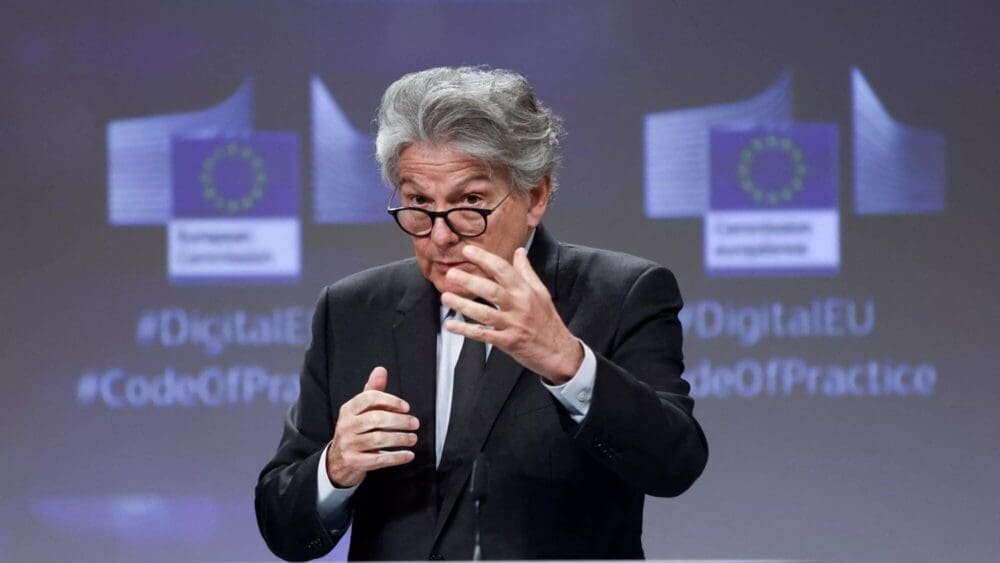
Thierry Breton
The conservative Patriots for Europe, the third largest group in the European Parliament, are demanding answers from the European Commission regarding an alleged secret deal offered to billionaire Elon Musk’s X social media platform to censor free speech.
In their letter to the Commission, the Patriots write that if such a deal has indeed been offered to Musk, it would raise “serious concerns about the push by the Commission for the censorship of politically undesirable content.”
“The censorship of political opinions and blackmailing X is unacceptable,” First Vice President of the Patriots for Europe, Gál Kinga wrote in a tweet on Monday, July 29th.
We put a question to the @EU_Commission concerning the alleged deal they offered to @elonmusk about secretly censoring speech on the platform. Biased application of EU media regulation, the censorship of political opinions & blackmailing @X is unacceptable. Find the letter below… pic.twitter.com/NkA5qiyF9y
— Kinga Gál (@kingagalMEP) July 29, 2024
Patriot MEPs are demanding more transparency from the Commission on the secret deal and on the application of the Digital Services Act in general. As Kinga Gál and fellow Patriots for Europe MEP Tamás Deutsch told us: after an admissibility check by the European Parliament President, the Commission has six weeks to answer their questions. “If this deadline is not met, we have the possibility to put the issue on the EP’s agenda. We are eager to see how the “transparency and rule of law champions” in Brussels react!”
In a joint statement to The European Conservative, Gál and Deutsch said:
We are not at all surprised about this behaviour of the Commission. It has proved on numerous occasions—see the rule of law jihad and the withholding of EU funds against Hungary, for instance—that it does not refrain from blackmailing and threatening those who hold different political views.
This underlines once again that the Brussels elite tramples on EU law and values, and abuses legal procedures shamelessly if this is what serves their political and power interests. In general, freedom of speech is increasingly under attack in the Western world, including Brussels, so we must do our utmost to defend it. That is why this case is so important.
The Commission launched an investigation in December under the EU’s Digital Services Act (DSA) to examine whether X disseminated “illegal content” and whether its efforts to combat disinformation were effective enough. The DSA came into force two years ago and requires social media platforms and search engines, such as Google, Facebook, and X, to do more to tackle illegal content.
The Commission reported its findings a few weeks ago, establishing that Musk’s social media platform breached elements of the DSA. Brussels took issue, among other things, with X’s use of blue checkmarks which are used to verify accounts on the platform. Users can acquire them for €10 per month, but the Commission says anyone can subscribe to obtain such a verified status, and there is evidence of “motivated malicious actors” abusing the verified account to deceive users.
Back in the day, #BlueChecks used to mean trustworthy sources of information✔️🐦
— Thierry Breton (@ThierryBreton) July 12, 2024
Now with X, our preliminary view is that:
❌They deceive users
❌They infrige #DSA
X has now the right of defence —but if our view is confirmed we will impose fines & require significant changes. pic.twitter.com/M9tGA5pYQr
The European Commission for Internal Market, Thierry Breton, said “If our view is confirmed we will impose fines and require significant changes.” In the event of proven infringements, penalties can include fines of up to 6% of the company’s global revenues. For serious and repeated violations, the EU can ban a platform operating in the 27-nation bloc.
The Commission’s findings led to a war of words between Breton and Musk, with the latter accusing Brussels of offering X an illegal secret deal. “If we quietly censored speech without telling anyone, they would not fine us,” Musk tweeted, adding that while other platforms accepted that deal, X did not.
The European Commission offered 𝕏 an illegal secret deal: if we quietly censored speech without telling anyone, they would not fine us.
— Elon Musk (@elonmusk) July 12, 2024
The other platforms accepted that deal.
𝕏 did not. https://t.co/4lKsaRsYoA
Musk then went on to say that he is looking forward to “a very public battle in court, so that the people of Europe can know the truth.” Breton rejected the accusation that such a secret deal exists and invited Musk to take the Commission to court.
Since acquiring one of the biggest social media platforms in the world, American-South African entrepreneur Musk has aimed to make X (formerly known as Twitter) a platform for free speech, restoring the banned accounts of public personalities, such as former U.S. President Donald Trump.
Elon Musk has been criticised by leftist-liberal commentators and decision-makers for his libertarian-conservative views, such as his rejection of illegal migration and the transgender ideology—positions that make him a preferred target for EU regulators.
It is no wonder that the Patriots for Europe group is sceptical of the Commission’s findings. In a letter to the Commission, the Patriots demanded to know what the content of the secret deal was, and whether threatening and punishing social media platforms for refusing to censor political opinions is in line with EU values, such as the rule of law and fundamental rights.
As Norman Lewis, visiting research fellow at MCC Brussels, wrote in his commentary for The European Conservative:
Doing backroom deals with social media platforms to conceal censorship from the electorate is neither an accident nor unexpected. It simply brings into the cold light of day the extent of the EU elite’s contempt for the electorate and democracy.
